新概念英语第二册Lesson 2 Breakfast or lunch?课件(共52张PPT)
文档属性
| 名称 | 新概念英语第二册Lesson 2 Breakfast or lunch?课件(共52张PPT) | 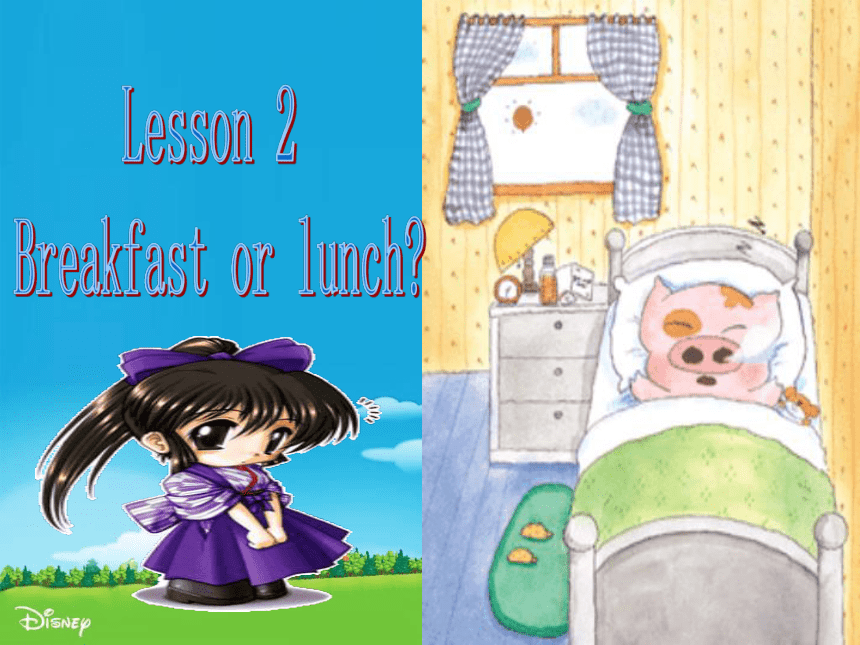 | |
| 格式 | ppt | ||
| 文件大小 | 10.9MB | ||
| 资源类型 | 教案 | ||
| 版本资源 | 新概念英语 | ||
| 科目 | 英语 | ||
| 更新时间 | 2023-10-06 07:46:34 | ||
图片预览

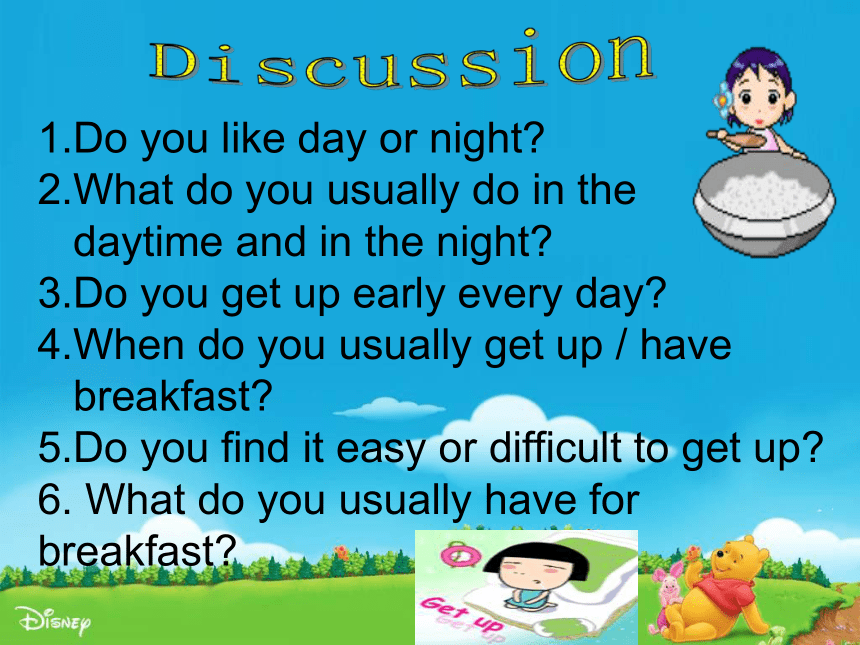
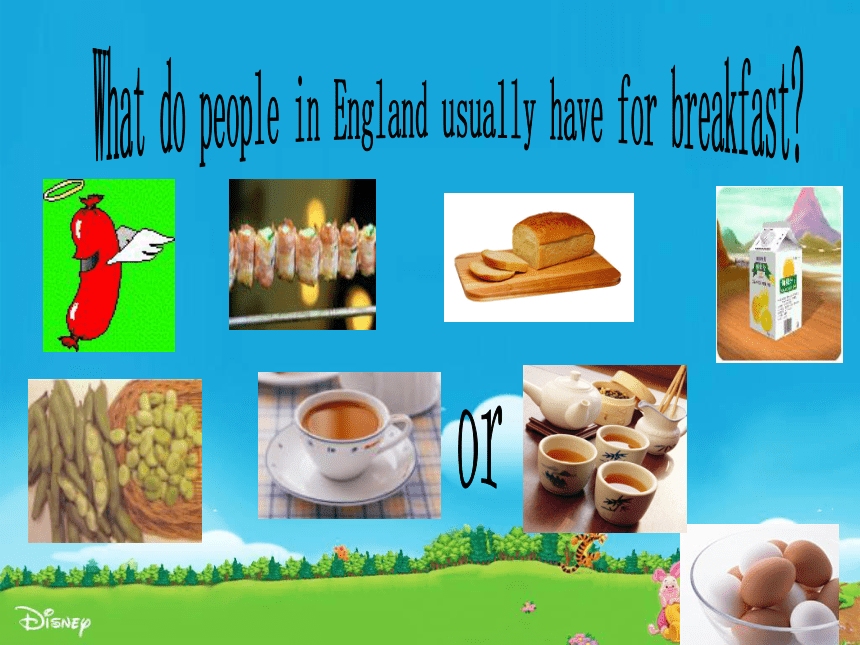
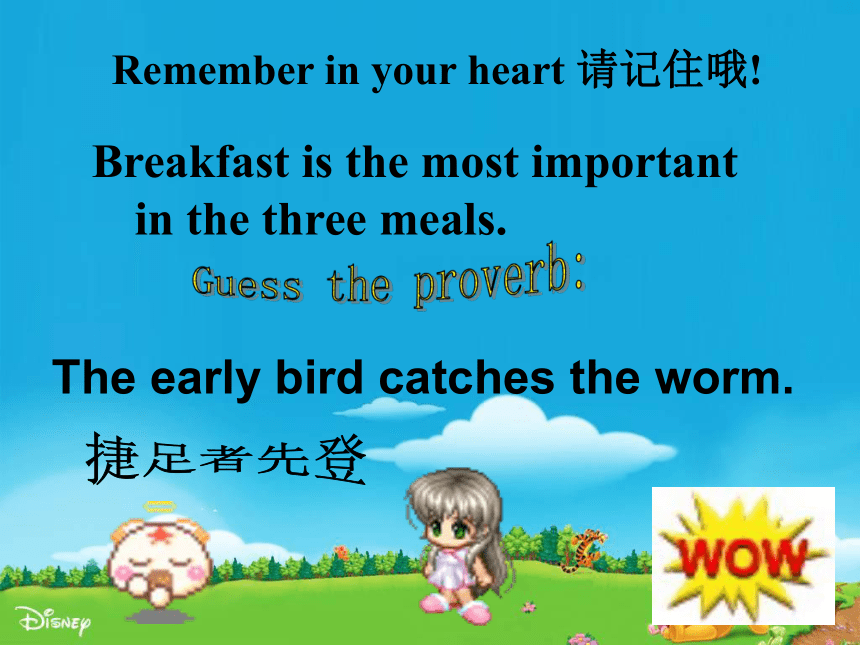
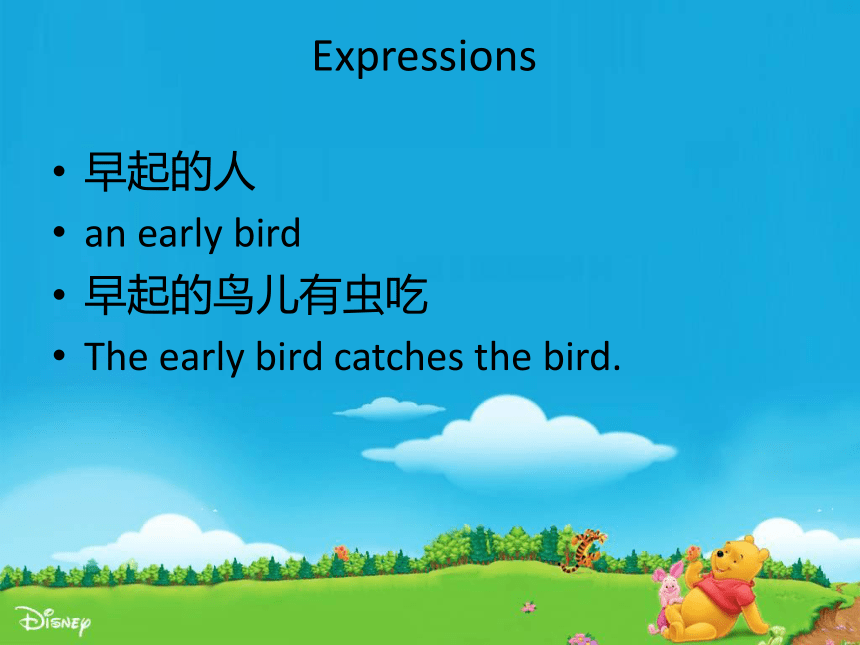
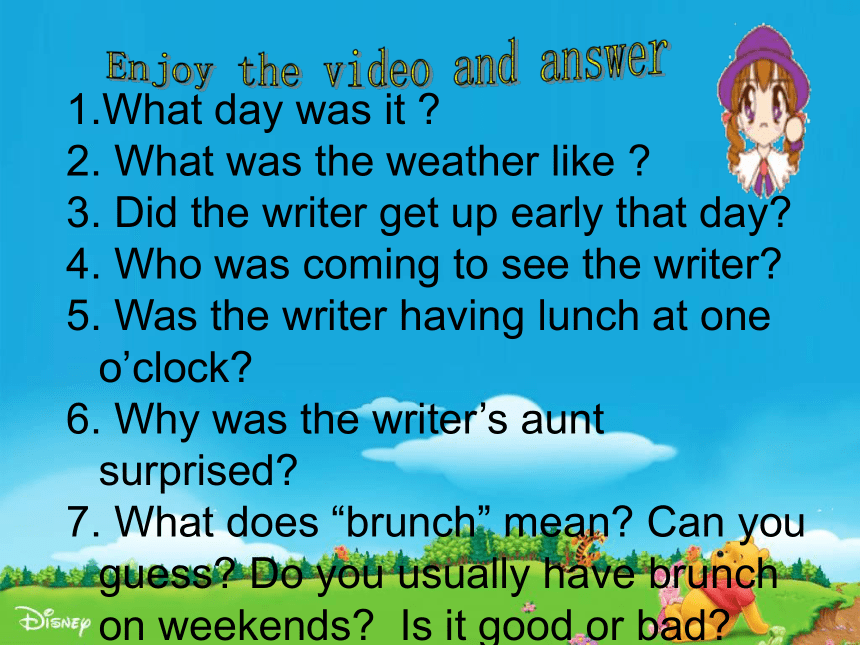
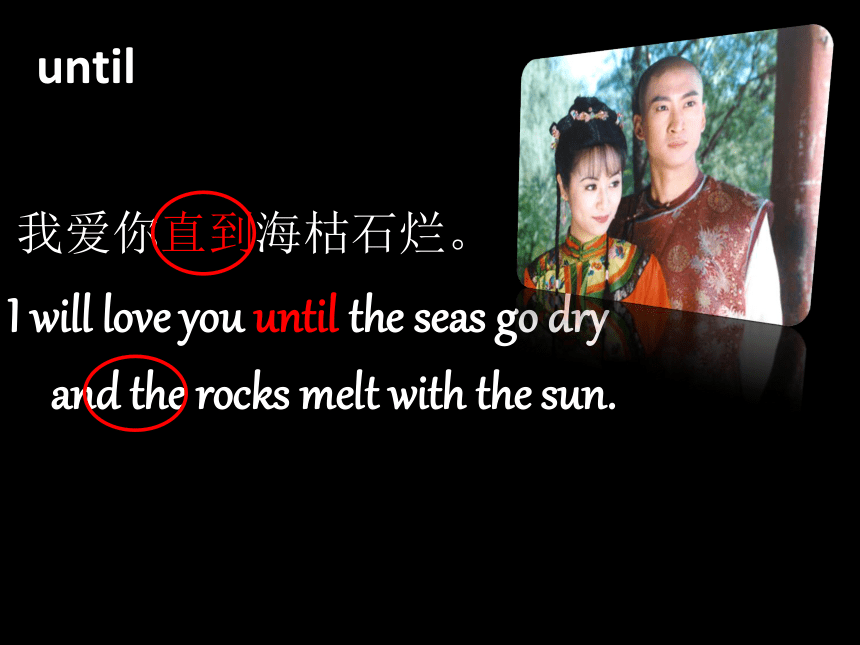
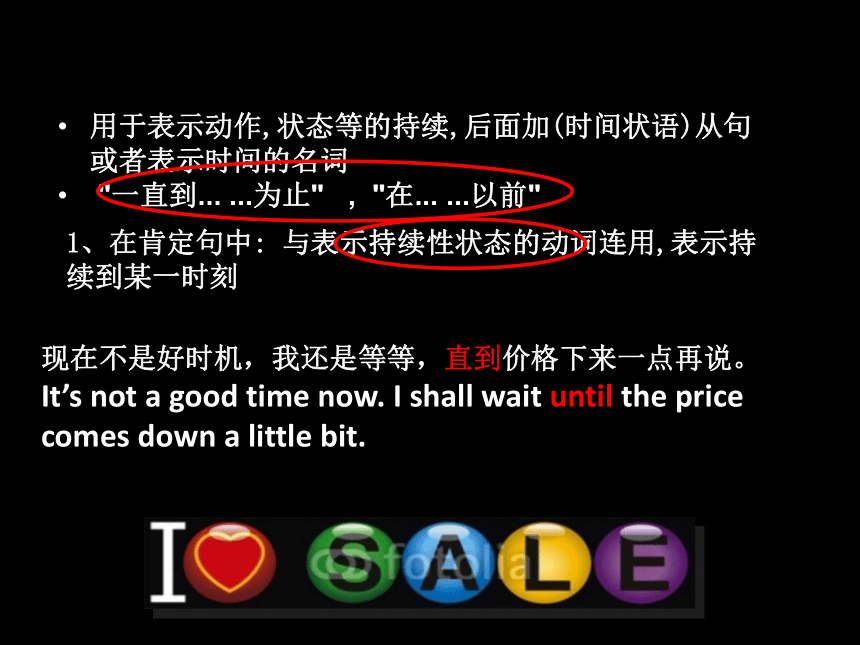
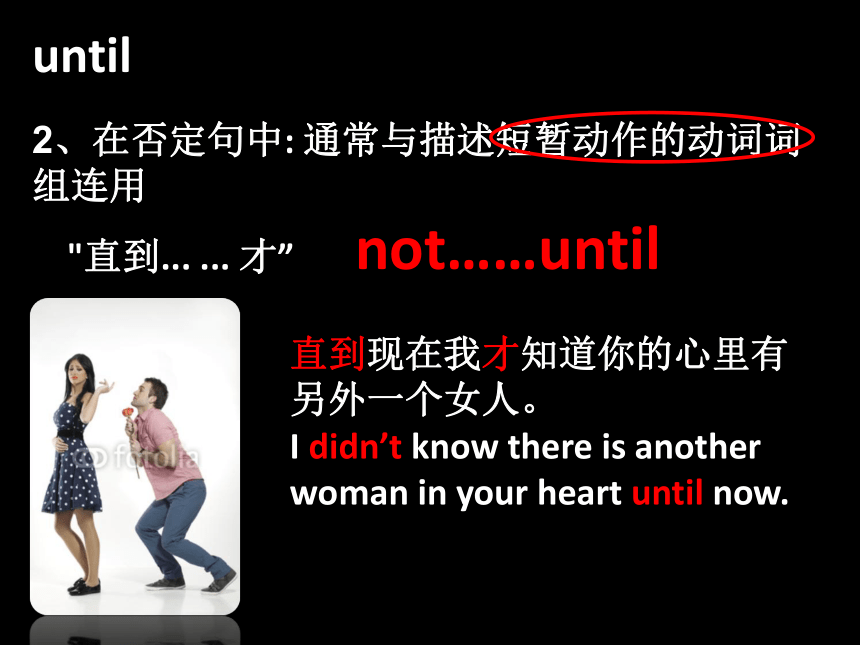
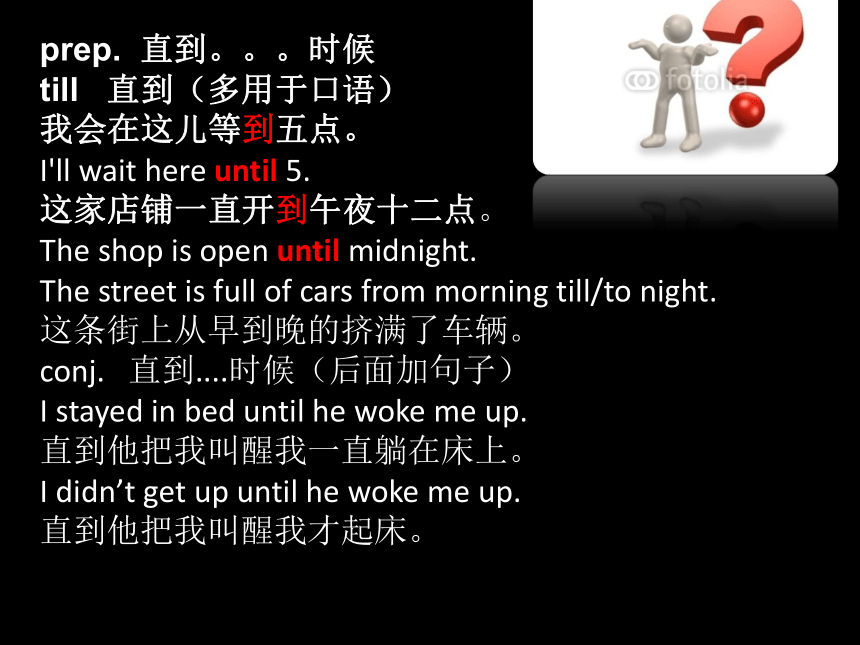
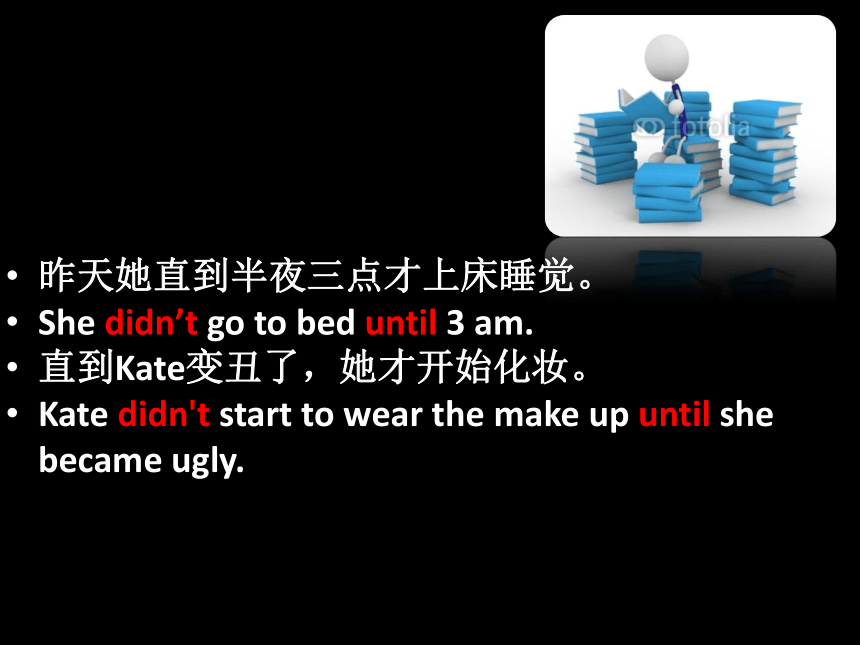
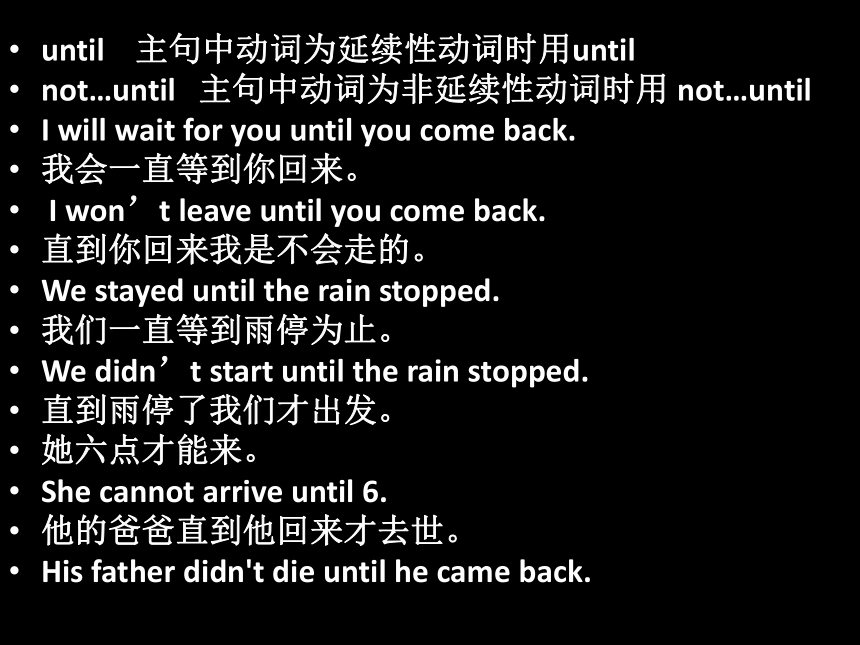
文档简介
(共53张PPT)
1.Do you like day or night
2.What do you usually do in the
daytime and in the night
3.Do you get up early every day
4.When do you usually get up / have
breakfast
5.Do you find it easy or difficult to get up
6. What do you usually have for breakfast
Remember in your heart 请记住哦!
Breakfast is the most important in the three meals.
The early bird catches the worm.
Expressions
早起的人
an early bird
早起的鸟儿有虫吃
The early bird catches the bird.
What day was it
What was the weather like
Did the writer get up early that day
Who was coming to see the writer
Was the writer having lunch at one o’clock
Why was the writer’s aunt surprised
What does “brunch” mean Can you guess Do you usually have brunch on weekends Is it good or bad
我爱你直到海枯石烂。
I will love you until the seas go dry and the rocks melt with the sun.
until
用于表示动作,状态等的持续,后面加(时间状语)从句或者表示时间的名词
"一直到... ...为止" , "在... ...以前"
1、在肯定句中: 与表示持续性状态的动词连用,表示持续到某一时刻
现在不是好时机,我还是等等,直到价格下来一点再说。
It’s not a good time now. I shall wait until the price
comes down a little bit.
2、在否定句中: 通常与描述短暂动作的动词词组连用
"直到... ... 才” not……until
直到现在我才知道你的心里有另外一个女人。
I didn’t know there is another woman in your heart until now.
until
prep. 直到。。。时候
till 直到(多用于口语)
我会在这儿等到五点。
I'll wait here until 5.
这家店铺一直开到午夜十二点。
The shop is open until midnight.
The street is full of cars from morning till/to night.
这条街上从早到晚的挤满了车辆。
conj. 直到....时候(后面加句子)
I stayed in bed until he woke me up.
直到他把我叫醒我一直躺在床上。
I didn’t get up until he woke me up.
直到他把我叫醒我才起床。
昨天她直到半夜三点才上床睡觉。
She didn’t go to bed until 3 am.
直到Kate变丑了,她才开始化妆。
Kate didn't start to wear the make up until she became ugly.
until 主句中动词为延续性动词时用until
not…until 主句中动词为非延续性动词时用 not…until
I will wait for you until you come back.
我会一直等到你回来。
I won’t leave until you come back.
直到你回来我是不会走的。
We stayed until the rain stopped.
我们一直等到雨停为止。
We didn’t start until the rain stopped.
直到雨停了我们才出发。
她六点才能来。
She cannot arrive until 6.
他的爸爸直到他回来才去世。
His father didn't die until he came back.
Excuse me, can you repeat?(May I have your pardon?)
不要老犯这种错误。
Be careful next time, don’t repeat the same mistakes。
repeat v.重复
outside
It was dark outside.
我男朋友正在外面等着我。
My boyfriend is waiting for me outside.
1) n.
the outside of the house 房子的外面
2) adj.
an outside toilet 户外的厕所 outside help 外来的帮助
3)adv.
外面很黑。
It was dark outside.
请在外面等候。
Please wait outside.
不要出去因为太冷了。
Don’t go outside because it’s too cold.
4)prep.
It’s outside my business.
这不关我的事。
反义词:inside n./adj./adv./prep.
arrive vi. 到达,抵达
arrive at
他今天早上6点到达车站。
He arrived at the station at six this morning.
我晚上很晚到达酒店。
I arrived at my hotel late in the evening.
(经过努力)达到,做出
After many hours talk, the committee arrived at a decision.
arrive in
到上海给我打电话。
Call me when you arrive in Shanghai.
她周五到达巴黎。
She arrived in Paris on Friday.
arrive vi. 到达,抵达
小地点
每天早晨闹钟十点响。
Every morning the alarm clock rings at 10.
电话正在响。
The telephone is ringing.
刚才门铃响了吗?
Did doorbell just ring
ring(rang,rung)vi.铃响;按铃
ring sb.
每次我跟她打电话,她的电话总是占线。
Every time I ring her, the phone is engaged.
警察包围了这座大楼。
Police rang the building.
ring(rang,rung)vt.打电话;包围
give sb. a ring/call (ring sb.)
我的男朋友昨晚给了我一个礼物,一个订婚戒指!
My boyfriend gave me a present last night - an engagement ring !
ring finger
ring n.戒指;铃声,钟声;拳击场;环形物
ring
1) n. 环状物,(尤指)戒指
a wedding ring 婚戒 a diamond ring 钻戒 a gold ring
dark rings around her eyes 黑眼圈
ring-road 环状公路
ring finger 无名指
大拇指:thumb
食指:index finger; the first finger; pointer
中指:middle finger; the second finger
无名指:ring finger; the third ginger
小拇指:little finger; pinkie
have a ring on the middle finger (engaged 订婚)
have a ring on the third finger (married 已婚)
2)v. (铃,电话等)响
ring – rang – rung
刚刚门铃响了。
The door bell rang just now.
I rang the bell. 我按响了门铃。
电话响的时候你去接电话好吗?
Will you answer the phone when it rings
3)v. (=U.S. call) 打电话
ring sb (up) =call sb (up) = phone sb = telephone sb
give sb a phone call
I’ll ring you later.
我会晚点给你打电话。
ring off: put down the receiver; hang off 挂断电话
He rang off before I could explain.
我还没解释他就挂断电话了。
surprised adj.感到惊讶的
be surprised at...
我对她的反应很吃惊。
I was surprised at her reaction.
They were surprised at seeing the teacher in front of them.
be surprised to do...
我很吃惊听到那件事!
I 'm surprised to hear that!
我们很吃惊知道他是法国人。
We were surprised to learn that he was French.
surprised adj.
surprised (that clause)
我很吃惊她没有当场炒了你。
I am surprised (that) she did not fire you on the spot.
他如此吃惊他们是同类人。
He is so surprised that they are the same person.
surprised adj.
I never get up early on Sundays.
我从没出过国。
I have never been abroad.
我从不在早上10前起床。
I never get up before 10 o’clock in mornings.
Never fear. 别害怕。
Never give up. 永不放弃。
Never say die. 永不言败。
Never lose heart. 绝不要灰心丧气。
early adj. / adv.
an early morning 一大早
The early bird catches the worm.
早起的鸟能捉到虫。 捷足先登。
今天早晨我起得很早。
I got up early this morning.
I sometimes stay in bed until lunchtime.
sometimes
有时候
some times
几次,几倍
some time
一段时间
sometime
将来或过去的某个时候
I will be somebody sometime in the future.
总有一天我将是个大人物。
Last Sunday I got up very late.
late adj. /adv. 晚
对不起我迟到了。
I’m sorry for being late.
I got up very late. 我起床起得很晚。
stay up late
熬夜,醒着,不去睡
lately : recently 最近
你最近出过国吗?
Have you been abroad lately
最近我买了辆新车。
I bought a new car lately.
Lately 通常放在现在完成时和一般过去时中。
I looked out of the window.
look out of 向....外看
look out of the window 向窗外看
look out of the door 向门外看
look into
1. 向...里看
look into the box 向盒子里面看
2. 调查,分析
The police are looking into the case.
警察正在调查这个案件。
Look out !
小心,当心
Look out ! The car nearly knocked you over.
当心!这个车差点撞到你。
“I’ve just arrived by train,” she said.
我走路来的。
I came here on foot. (I walked here.)
我们骑马上山。
We got into the mountain on horseback.
take a train 乘坐火车 take a bus/take a car
take a plane take a ship
表示交通方式的时候用 by 直接加交通工具,不加冠词
强调动作本身,用take加冠词,在加工具本身。
In order to go to school on time, I took a taxi.
为了准时上学去,我打了一辆车。
Sentence & Grammar
感叹句 (以what引导感叹句表示愤怒,喜悦,惊奇,赞赏等感情)
What a day(it is)!
What interesting books (they are)!
What an interesting story (it is)!
What a nerd (he is)!
What + (a / an) + 形容词 + 名词 + (主语 + 谓语)!
!sunny day a what is it
造句: What a/an___________!
Cold!
What beautiful flowers they are !
How beautiful the flowers are !
2. ______ __ busy man he is !
______ ______ the man is !
3. ______ __ happy baby it is !
_____ ______ the baby is !
What
a
How
busy
What
a
How
happy
4. What a high mountain ____ ____ !
How high the ______ _____ !
5. What a hungry boy _____ _____ !
How hungry the _____ ____ !
it
is
mountain
is
he
is
boy
is
2. 表述频度的副词
never、seldom、sometimes、often、always、still…
约会我从来不迟到。
I'm never late for appointments.
有时他给我们讲笑话。
Sometimes he tells us jokes.
我们经常在咖啡馆见面。
We often meet at the coffee shop.
她对人们一直很亲切,友善。
She is always nice and friendly to people.
你仍在工作吗?
Are you still working
我很少看电视。
I seldom watch TV.
Simple Present Tense 一般现在时
(1)表现在的事实、状态或动作
鸟飞。
Birds fly.
她爱音乐。
She loves music.
Mary的父母起的很早。
Mary's parents get up very early.
(2)表习惯性动作或职业,常与时间副词连用
晚饭后我总是散步。
I always take a walk after supper.
她常常给我写信。
She writes to me very often.
(3)表客观真理,格言警句或事实
The Earth moves round the sun.
The sun rises in the east and sets in the west.
Two and two makes four.
(4)表将来
在由when,after, before,as,as soon as,although,because,if,even if,in case,till,until,unless,so long as,where,whatever,wherever 等引导的状语从句中用一般现在时表将来发生的动作。
I'll tell her when she comes tomorrow.
Even if it rains this afternoon, I'll meet you.
Whatever (happen), you should keep cool-headed.
I‘ll be right here waiting for you wherever you (go).
按时间表示将要发生的动作或事件,用一般现在时表达将来时概念。
The play begins at 6:30 this evening.
When does the plane take off
He leaves for that city next week.
happens
go
1. The Browns ________ a nice car and Brown's brother ________ a nice jeep.
A. have / have B. has / has
C. have / has D. has / have
2. - ________ you think he will come - If it ________ tomorrow, he will not come.
Do / rains B. Are / rains
C. Do / will rain D. Are / will rain
3. The little child ________ not even know that the moon ________ around the earth.
A. do / move B. do / moves
C. does / moves D. did / moved
4. 现在进行时:is / am / are + 现在分词(V-ing)
表示现在正在进行的动作。
The kettle is boiling. Shall I make tea
你不认为你吃的太多了吗?你增重了。
Don’t you think you eat too much You’re (put) on weight.
The workers are (build) a new bridge across the river.
表现阶段正进行的动作。
He is taking physics this semester.
我们正在准备这个星期的期末考试。
We are preparing for our final examination this week.
putting
building
go, come, leave, arrive, land, meet, die, start, return, join等用于进行时态时表示即将开始的动作。
看!车来了!
Look! The bus is coming.
这个老人病的很严重,他要死了。
The old man is seriously ill, and he is dying.
Alice和她的妈妈马上前往北京。
Alice is leaving for Beijing with her mother.
与 always, forever, continually, constantly 等副词连用,表示说话人带有感彩:赞赏或厌恶。
他总是为他人考虑。
He is always thinking of others.
The boy is continually making noises.
下面表示状态、感觉、情绪、精神活动的动词不可用于进行时。
● 注意:have a party / think about可以用进行时,因为这里have意为“举行”;think意为“考虑”。
look(看起来)
seem(看上去)
show(显示)
mind(介意)
have(有)
sound(听起来)
taste(尝起来)
require(要求)
possess(拥有)
care(关心)
like(喜欢)
hate(讨厌)
love(喜爱)
believe(相信)
doubt(怀疑)
see(看见)
hear(听见)
know(知道)
understand (理解)
belong(属于)
think(认为)
consider(认为)
feel(觉得)
detest(憎恨)
desire(意欲)
1. How can you ________ If you are not ________
A. listening / hearing B. hear / listening
C. be listening / heard D. be hearing / listening to
2.The girl even won't have her lunch before she ________ her homework.
A. will finish B. is finishing
C. had finished D. finishes
3. The old scientist ________ to do more for the country.
A. is wishing B. has been wishing
C. wishes D. has been wished
4. If he ________, don't wake him up.
A. still sleeps B. is still sleeping
C. still has been sleeping D. will be sleeping still
On Sundays / in the morning / at one o’clock
until
look out of / look into
It was my aunt Lucy
by train / car / bus / ship / on foot
I’m coming to see you.
Dear me = My goodness! = Good heavens
never – seldom – usually – often -- always
What a day! (What an awful day it is = How awful today is.
c 2. d 3.c 4. c 5. a 6. b
7. b 8.a 9. d 10. c 11. d
12. b
never – early – Sundays – very late – looked – window– dark outside– raining – just then – rang – Aunt Lucy – arrived – train – coming to see – still – breakfast – very surprised – dear me – one o’clock
1. Don’t behave(举止) so r ________. I can’t b_______ you.
2. I didn’t quite catch you. Would you please r ________
3. Shall we meet o_________ the school gate at 2 o’clock this afternoon
4. Please pay a ____________ to your pronunciation.
5. He got very a_______ and shut the door a____________.
6. I didn’t go to bed u________ 12 o’clock last night.
7. The bell is r__________ now. It’s time for class.
8. Your father’s sister is you're a_________.
9. He’s gone to Beijing on b_____________(出差)
10. Shall we go to the t ____________ tomorrow evening There is a new play on show.
练习
1. I didn’t tell her the truth. She was very a__________.
2. These are my p__________ letter. You can’t read it.
3. I’ve got a headache. I can’t b__________ it.
4. She shut the door r__________ and went out.
5. This is not your s__________. You can’t sit here.
6. Could you speak more s__________ I can’t hear you.
7. The girl didn’t pay a_________ to the teacher.
8. I don’t know. It’s none of my b__________.
9. This famous p_________ was written by Shakespeare.
10. “Who has broken my glass ” he asked a_________.
11. Take an umbrella, Sam. It is raining o_________.
12. I didn’t hear you. Could you r__________ your question
13. We waited u_________ ten o’clock last night.
14. That woman is my a_________. She is my mother’s sister.
15. I’m s_________ thirsty. Please give me more water.
1. Do you enjoy _____ English in our class, Mr. Green
A. teach B. taught C. to teach D. teaching
2. —Mum, we’ll have a party this evening. —Enjoy _____.
A. ourselves B. themselves C. yourselves D. yourself
3. The park was full of people _____ themselves in the sunshine.
A. who enjoyed B. was enjoying C. enjoying D. enjoyed
4. How much did they _____ you for your help
A. spend B. cost C. pay D. take
5. Cleaning women in big cities are usually _____ by the hour.
A. pay B. paying C. paid D. to pay
6. In the morning, I go to _____ school by bus. In the afternoon, Dad will go to _____ school to take me home.
A. the, the B. /,/ C. the, / D. /, the
7. All the students were tired, but _____ of them stopped to have a rest.
A. both B. none C. any D. neither
8. When I knew he did that to me, I ______ very angry.
A. was B. had been C. got D. had got
10. She repeated what Michael ______ her.
A. told B. was telling C. tells D. had told
11. ______ the morning of last Sunday, Jenny was found dead in her
room. A. In B. When C. On D. By
12. Don’t get on the bus ______ it has stopped.
A. until B. after C. since D. when
13. ______ a lovely day! Why not go out for a walk
A. What B. What a C. It is D. That is
14. I didn’t know about it ______ my aunt told me.
A. after B. until C. when D. since
15. ______ interesting books!
A. What B. What is C. What it is D. What is it
16. On Sunday he sometimes _____ his clothes and sometimes _____ some shopping.
A. wash, do B. is washing, is doing
C. washes, does D. washes, is going to do
17. —Where’s your father —He _____ in the kitchen.
A. cooks B. cooked C. is cooking D. has cooked
18. The twins usually ______ milk and bread for breakfast, but today
they _____ eggs.
A. have, have B. are having, are having
C. have, are having D. are having, have
19. Mr. Smith often _____ short stories, but he _____ a TV play these
days.
A. is writing, is writing B. is writing, writes
C. writes, is writing D. writes, writes
20. How much money did you ______ in repairing your stereo
A. cost B. pay C. spend D. use
The end.
Thank you!
1.Do you like day or night
2.What do you usually do in the
daytime and in the night
3.Do you get up early every day
4.When do you usually get up / have
breakfast
5.Do you find it easy or difficult to get up
6. What do you usually have for breakfast
Remember in your heart 请记住哦!
Breakfast is the most important in the three meals.
The early bird catches the worm.
Expressions
早起的人
an early bird
早起的鸟儿有虫吃
The early bird catches the bird.
What day was it
What was the weather like
Did the writer get up early that day
Who was coming to see the writer
Was the writer having lunch at one o’clock
Why was the writer’s aunt surprised
What does “brunch” mean Can you guess Do you usually have brunch on weekends Is it good or bad
我爱你直到海枯石烂。
I will love you until the seas go dry and the rocks melt with the sun.
until
用于表示动作,状态等的持续,后面加(时间状语)从句或者表示时间的名词
"一直到... ...为止" , "在... ...以前"
1、在肯定句中: 与表示持续性状态的动词连用,表示持续到某一时刻
现在不是好时机,我还是等等,直到价格下来一点再说。
It’s not a good time now. I shall wait until the price
comes down a little bit.
2、在否定句中: 通常与描述短暂动作的动词词组连用
"直到... ... 才” not……until
直到现在我才知道你的心里有另外一个女人。
I didn’t know there is another woman in your heart until now.
until
prep. 直到。。。时候
till 直到(多用于口语)
我会在这儿等到五点。
I'll wait here until 5.
这家店铺一直开到午夜十二点。
The shop is open until midnight.
The street is full of cars from morning till/to night.
这条街上从早到晚的挤满了车辆。
conj. 直到....时候(后面加句子)
I stayed in bed until he woke me up.
直到他把我叫醒我一直躺在床上。
I didn’t get up until he woke me up.
直到他把我叫醒我才起床。
昨天她直到半夜三点才上床睡觉。
She didn’t go to bed until 3 am.
直到Kate变丑了,她才开始化妆。
Kate didn't start to wear the make up until she became ugly.
until 主句中动词为延续性动词时用until
not…until 主句中动词为非延续性动词时用 not…until
I will wait for you until you come back.
我会一直等到你回来。
I won’t leave until you come back.
直到你回来我是不会走的。
We stayed until the rain stopped.
我们一直等到雨停为止。
We didn’t start until the rain stopped.
直到雨停了我们才出发。
她六点才能来。
She cannot arrive until 6.
他的爸爸直到他回来才去世。
His father didn't die until he came back.
Excuse me, can you repeat?(May I have your pardon?)
不要老犯这种错误。
Be careful next time, don’t repeat the same mistakes。
repeat v.重复
outside
It was dark outside.
我男朋友正在外面等着我。
My boyfriend is waiting for me outside.
1) n.
the outside of the house 房子的外面
2) adj.
an outside toilet 户外的厕所 outside help 外来的帮助
3)adv.
外面很黑。
It was dark outside.
请在外面等候。
Please wait outside.
不要出去因为太冷了。
Don’t go outside because it’s too cold.
4)prep.
It’s outside my business.
这不关我的事。
反义词:inside n./adj./adv./prep.
arrive vi. 到达,抵达
arrive at
他今天早上6点到达车站。
He arrived at the station at six this morning.
我晚上很晚到达酒店。
I arrived at my hotel late in the evening.
(经过努力)达到,做出
After many hours talk, the committee arrived at a decision.
arrive in
到上海给我打电话。
Call me when you arrive in Shanghai.
她周五到达巴黎。
She arrived in Paris on Friday.
arrive vi. 到达,抵达
小地点
每天早晨闹钟十点响。
Every morning the alarm clock rings at 10.
电话正在响。
The telephone is ringing.
刚才门铃响了吗?
Did doorbell just ring
ring(rang,rung)vi.铃响;按铃
ring sb.
每次我跟她打电话,她的电话总是占线。
Every time I ring her, the phone is engaged.
警察包围了这座大楼。
Police rang the building.
ring(rang,rung)vt.打电话;包围
give sb. a ring/call (ring sb.)
我的男朋友昨晚给了我一个礼物,一个订婚戒指!
My boyfriend gave me a present last night - an engagement ring !
ring finger
ring n.戒指;铃声,钟声;拳击场;环形物
ring
1) n. 环状物,(尤指)戒指
a wedding ring 婚戒 a diamond ring 钻戒 a gold ring
dark rings around her eyes 黑眼圈
ring-road 环状公路
ring finger 无名指
大拇指:thumb
食指:index finger; the first finger; pointer
中指:middle finger; the second finger
无名指:ring finger; the third ginger
小拇指:little finger; pinkie
have a ring on the middle finger (engaged 订婚)
have a ring on the third finger (married 已婚)
2)v. (铃,电话等)响
ring – rang – rung
刚刚门铃响了。
The door bell rang just now.
I rang the bell. 我按响了门铃。
电话响的时候你去接电话好吗?
Will you answer the phone when it rings
3)v. (=U.S. call) 打电话
ring sb (up) =call sb (up) = phone sb = telephone sb
give sb a phone call
I’ll ring you later.
我会晚点给你打电话。
ring off: put down the receiver; hang off 挂断电话
He rang off before I could explain.
我还没解释他就挂断电话了。
surprised adj.感到惊讶的
be surprised at...
我对她的反应很吃惊。
I was surprised at her reaction.
They were surprised at seeing the teacher in front of them.
be surprised to do...
我很吃惊听到那件事!
I 'm surprised to hear that!
我们很吃惊知道他是法国人。
We were surprised to learn that he was French.
surprised adj.
surprised (that clause)
我很吃惊她没有当场炒了你。
I am surprised (that) she did not fire you on the spot.
他如此吃惊他们是同类人。
He is so surprised that they are the same person.
surprised adj.
I never get up early on Sundays.
我从没出过国。
I have never been abroad.
我从不在早上10前起床。
I never get up before 10 o’clock in mornings.
Never fear. 别害怕。
Never give up. 永不放弃。
Never say die. 永不言败。
Never lose heart. 绝不要灰心丧气。
early adj. / adv.
an early morning 一大早
The early bird catches the worm.
早起的鸟能捉到虫。 捷足先登。
今天早晨我起得很早。
I got up early this morning.
I sometimes stay in bed until lunchtime.
sometimes
有时候
some times
几次,几倍
some time
一段时间
sometime
将来或过去的某个时候
I will be somebody sometime in the future.
总有一天我将是个大人物。
Last Sunday I got up very late.
late adj. /adv. 晚
对不起我迟到了。
I’m sorry for being late.
I got up very late. 我起床起得很晚。
stay up late
熬夜,醒着,不去睡
lately : recently 最近
你最近出过国吗?
Have you been abroad lately
最近我买了辆新车。
I bought a new car lately.
Lately 通常放在现在完成时和一般过去时中。
I looked out of the window.
look out of 向....外看
look out of the window 向窗外看
look out of the door 向门外看
look into
1. 向...里看
look into the box 向盒子里面看
2. 调查,分析
The police are looking into the case.
警察正在调查这个案件。
Look out !
小心,当心
Look out ! The car nearly knocked you over.
当心!这个车差点撞到你。
“I’ve just arrived by train,” she said.
我走路来的。
I came here on foot. (I walked here.)
我们骑马上山。
We got into the mountain on horseback.
take a train 乘坐火车 take a bus/take a car
take a plane take a ship
表示交通方式的时候用 by 直接加交通工具,不加冠词
强调动作本身,用take加冠词,在加工具本身。
In order to go to school on time, I took a taxi.
为了准时上学去,我打了一辆车。
Sentence & Grammar
感叹句 (以what引导感叹句表示愤怒,喜悦,惊奇,赞赏等感情)
What a day(it is)!
What interesting books (they are)!
What an interesting story (it is)!
What a nerd (he is)!
What + (a / an) + 形容词 + 名词 + (主语 + 谓语)!
!sunny day a what is it
造句: What a/an___________!
Cold!
What beautiful flowers they are !
How beautiful the flowers are !
2. ______ __ busy man he is !
______ ______ the man is !
3. ______ __ happy baby it is !
_____ ______ the baby is !
What
a
How
busy
What
a
How
happy
4. What a high mountain ____ ____ !
How high the ______ _____ !
5. What a hungry boy _____ _____ !
How hungry the _____ ____ !
it
is
mountain
is
he
is
boy
is
2. 表述频度的副词
never、seldom、sometimes、often、always、still…
约会我从来不迟到。
I'm never late for appointments.
有时他给我们讲笑话。
Sometimes he tells us jokes.
我们经常在咖啡馆见面。
We often meet at the coffee shop.
她对人们一直很亲切,友善。
She is always nice and friendly to people.
你仍在工作吗?
Are you still working
我很少看电视。
I seldom watch TV.
Simple Present Tense 一般现在时
(1)表现在的事实、状态或动作
鸟飞。
Birds fly.
她爱音乐。
She loves music.
Mary的父母起的很早。
Mary's parents get up very early.
(2)表习惯性动作或职业,常与时间副词连用
晚饭后我总是散步。
I always take a walk after supper.
她常常给我写信。
She writes to me very often.
(3)表客观真理,格言警句或事实
The Earth moves round the sun.
The sun rises in the east and sets in the west.
Two and two makes four.
(4)表将来
在由when,after, before,as,as soon as,although,because,if,even if,in case,till,until,unless,so long as,where,whatever,wherever 等引导的状语从句中用一般现在时表将来发生的动作。
I'll tell her when she comes tomorrow.
Even if it rains this afternoon, I'll meet you.
Whatever (happen), you should keep cool-headed.
I‘ll be right here waiting for you wherever you (go).
按时间表示将要发生的动作或事件,用一般现在时表达将来时概念。
The play begins at 6:30 this evening.
When does the plane take off
He leaves for that city next week.
happens
go
1. The Browns ________ a nice car and Brown's brother ________ a nice jeep.
A. have / have B. has / has
C. have / has D. has / have
2. - ________ you think he will come - If it ________ tomorrow, he will not come.
Do / rains B. Are / rains
C. Do / will rain D. Are / will rain
3. The little child ________ not even know that the moon ________ around the earth.
A. do / move B. do / moves
C. does / moves D. did / moved
4. 现在进行时:is / am / are + 现在分词(V-ing)
表示现在正在进行的动作。
The kettle is boiling. Shall I make tea
你不认为你吃的太多了吗?你增重了。
Don’t you think you eat too much You’re (put) on weight.
The workers are (build) a new bridge across the river.
表现阶段正进行的动作。
He is taking physics this semester.
我们正在准备这个星期的期末考试。
We are preparing for our final examination this week.
putting
building
go, come, leave, arrive, land, meet, die, start, return, join等用于进行时态时表示即将开始的动作。
看!车来了!
Look! The bus is coming.
这个老人病的很严重,他要死了。
The old man is seriously ill, and he is dying.
Alice和她的妈妈马上前往北京。
Alice is leaving for Beijing with her mother.
与 always, forever, continually, constantly 等副词连用,表示说话人带有感彩:赞赏或厌恶。
他总是为他人考虑。
He is always thinking of others.
The boy is continually making noises.
下面表示状态、感觉、情绪、精神活动的动词不可用于进行时。
● 注意:have a party / think about可以用进行时,因为这里have意为“举行”;think意为“考虑”。
look(看起来)
seem(看上去)
show(显示)
mind(介意)
have(有)
sound(听起来)
taste(尝起来)
require(要求)
possess(拥有)
care(关心)
like(喜欢)
hate(讨厌)
love(喜爱)
believe(相信)
doubt(怀疑)
see(看见)
hear(听见)
know(知道)
understand (理解)
belong(属于)
think(认为)
consider(认为)
feel(觉得)
detest(憎恨)
desire(意欲)
1. How can you ________ If you are not ________
A. listening / hearing B. hear / listening
C. be listening / heard D. be hearing / listening to
2.The girl even won't have her lunch before she ________ her homework.
A. will finish B. is finishing
C. had finished D. finishes
3. The old scientist ________ to do more for the country.
A. is wishing B. has been wishing
C. wishes D. has been wished
4. If he ________, don't wake him up.
A. still sleeps B. is still sleeping
C. still has been sleeping D. will be sleeping still
On Sundays / in the morning / at one o’clock
until
look out of / look into
It was my aunt Lucy
by train / car / bus / ship / on foot
I’m coming to see you.
Dear me = My goodness! = Good heavens
never – seldom – usually – often -- always
What a day! (What an awful day it is = How awful today is.
c 2. d 3.c 4. c 5. a 6. b
7. b 8.a 9. d 10. c 11. d
12. b
never – early – Sundays – very late – looked – window– dark outside– raining – just then – rang – Aunt Lucy – arrived – train – coming to see – still – breakfast – very surprised – dear me – one o’clock
1. Don’t behave(举止) so r ________. I can’t b_______ you.
2. I didn’t quite catch you. Would you please r ________
3. Shall we meet o_________ the school gate at 2 o’clock this afternoon
4. Please pay a ____________ to your pronunciation.
5. He got very a_______ and shut the door a____________.
6. I didn’t go to bed u________ 12 o’clock last night.
7. The bell is r__________ now. It’s time for class.
8. Your father’s sister is you're a_________.
9. He’s gone to Beijing on b_____________(出差)
10. Shall we go to the t ____________ tomorrow evening There is a new play on show.
练习
1. I didn’t tell her the truth. She was very a__________.
2. These are my p__________ letter. You can’t read it.
3. I’ve got a headache. I can’t b__________ it.
4. She shut the door r__________ and went out.
5. This is not your s__________. You can’t sit here.
6. Could you speak more s__________ I can’t hear you.
7. The girl didn’t pay a_________ to the teacher.
8. I don’t know. It’s none of my b__________.
9. This famous p_________ was written by Shakespeare.
10. “Who has broken my glass ” he asked a_________.
11. Take an umbrella, Sam. It is raining o_________.
12. I didn’t hear you. Could you r__________ your question
13. We waited u_________ ten o’clock last night.
14. That woman is my a_________. She is my mother’s sister.
15. I’m s_________ thirsty. Please give me more water.
1. Do you enjoy _____ English in our class, Mr. Green
A. teach B. taught C. to teach D. teaching
2. —Mum, we’ll have a party this evening. —Enjoy _____.
A. ourselves B. themselves C. yourselves D. yourself
3. The park was full of people _____ themselves in the sunshine.
A. who enjoyed B. was enjoying C. enjoying D. enjoyed
4. How much did they _____ you for your help
A. spend B. cost C. pay D. take
5. Cleaning women in big cities are usually _____ by the hour.
A. pay B. paying C. paid D. to pay
6. In the morning, I go to _____ school by bus. In the afternoon, Dad will go to _____ school to take me home.
A. the, the B. /,/ C. the, / D. /, the
7. All the students were tired, but _____ of them stopped to have a rest.
A. both B. none C. any D. neither
8. When I knew he did that to me, I ______ very angry.
A. was B. had been C. got D. had got
10. She repeated what Michael ______ her.
A. told B. was telling C. tells D. had told
11. ______ the morning of last Sunday, Jenny was found dead in her
room. A. In B. When C. On D. By
12. Don’t get on the bus ______ it has stopped.
A. until B. after C. since D. when
13. ______ a lovely day! Why not go out for a walk
A. What B. What a C. It is D. That is
14. I didn’t know about it ______ my aunt told me.
A. after B. until C. when D. since
15. ______ interesting books!
A. What B. What is C. What it is D. What is it
16. On Sunday he sometimes _____ his clothes and sometimes _____ some shopping.
A. wash, do B. is washing, is doing
C. washes, does D. washes, is going to do
17. —Where’s your father —He _____ in the kitchen.
A. cooks B. cooked C. is cooking D. has cooked
18. The twins usually ______ milk and bread for breakfast, but today
they _____ eggs.
A. have, have B. are having, are having
C. have, are having D. are having, have
19. Mr. Smith often _____ short stories, but he _____ a TV play these
days.
A. is writing, is writing B. is writing, writes
C. writes, is writing D. writes, writes
20. How much money did you ______ in repairing your stereo
A. cost B. pay C. spend D. use
The end.
Thank you!
同课章节目录
